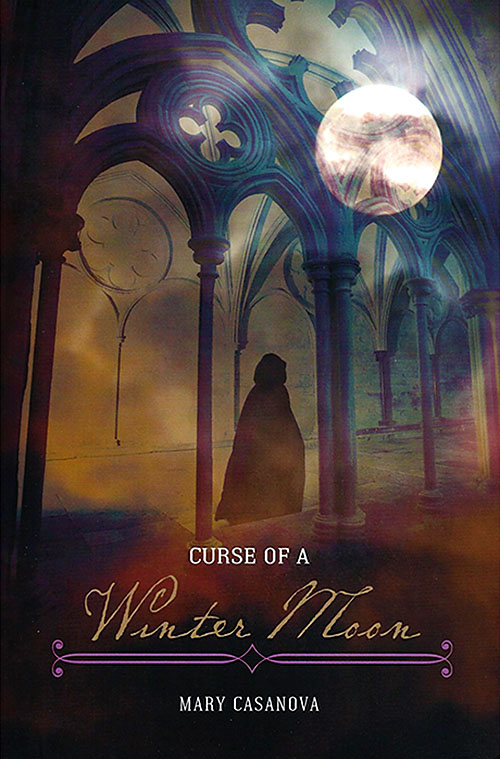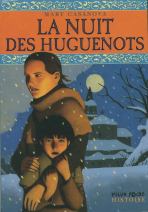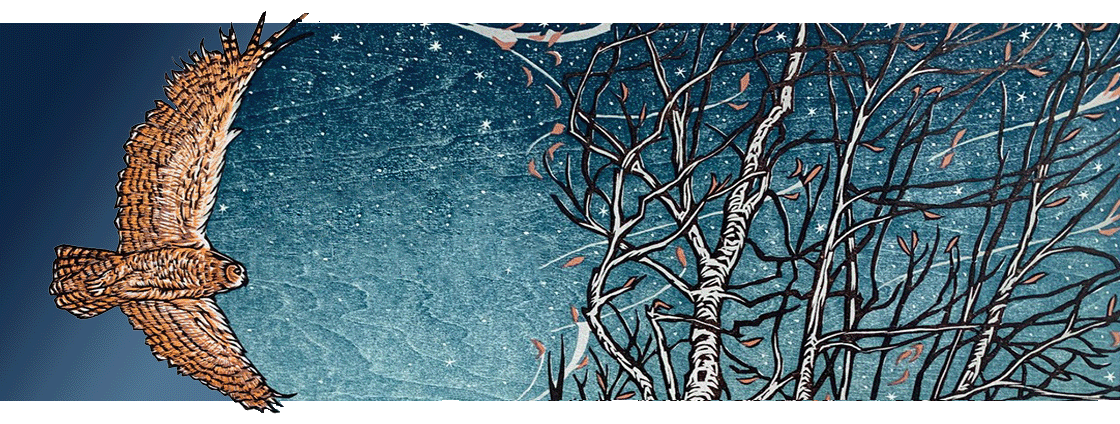
Curse of a Winter Moon
Pleasant Company, 2002
Paperback (reissued 2014):
978 – 0816692071
144 pages
Autographed copies of Curse of a Winter Moon are available from Mary’s online store.
French Edition

by Nathalie M.C. Laveroux Milan, 2002
La Nuit Des Huguenots
Provence, 1559: À mort les huguenots! À mort les sorcières et les loups-garous! Au Bûcher! 1559: le royaume de France connaît une période de troubles. Malheur à celui qu’on soupçonne d’ûtre un ennemi de l’Église! Marius est terrorisé, car dans son village, la chasse aux hérétiques a commencé. Et sa famille est une proie idéale…
Curse of a Winter Moon
written by Mary Casanova
Six years ago on Christmas Eve, Marius lost his beloved Mama when his brother Jean-Pierre was born. His mother’s dying wish still echoes in his mind: “Take good care of your brother.?
Caring for curious young Jean-Pierre would be a difficult challenge under the best of circumstances. But because Jean-Pierre was born on Christmas Eve, the villagers believe that he is marked with the curse of the loup garou — the werewolf — and will one day be called by the devil himself.
Every year, as Christmas Eve draws closer, Marius can sense the growing fear of the villagers as they watch for sinister changes in his brother. This December, however, they are swept up in a hysterical campaign to find and destroy enemies of the Church. And Jean-Pierre has become their target. Marius must defy the ruling institutions of the time to save his brother’s life — and his own.
Set in sixteenth-century France, this is an affecting and dramatic story of one young man’s search for truth among secrets and superstitions.
Reviews & Comments
…the narrative is full of life (and death). A lengthy author’s note explains the historical events that affect the story. A solid look at a period not often written about in novels for this age group.
—School Library Journal
This touching story of family loyalty and love is well written and has an interesting premise. The simple yet descriptive writing style lends itself beautifully to this story. … Curse of a Winter Moon is an exceptionally engaging book.
—VOYA
Readers expecting a werewolf story will find a far more realistic and frightening tale that offers an intriguing counterpoint to the well-trod horror genre. Here the evil is not the supernatural, but fear of it. This brief tale works as an excellent, exciting introduction to a turbulent period in history. An afterword ties the real history of the period to the fictional story, with a bibliography for further reading.
—Kirkus Reviews
Marius takes seriously his responsibility to watch over his brother while his father works in his blacksmith shop. Six years pass. Then … enemies of the church are rounded up to be burned at the stake. At first, Marius fears for his brother, but then the boy learns his father is a secret Huguenot. There’s a lot going on in this short book, yet Casanova manages to juggle it all.
—Booklist
Awards
- Minnesota Book Award Winner, 2001
Note from Mary
To research Curse of a Winter Moon, I traveled to the south of France where the story is set.
Curriculum Information
What is a Huguenot?
Although there is much disagreement about the origin of the word, “Huguenot” some believe it comes from a combination of a Dutch and a German word. In the Dutch-speaking North of France, Bible students who gathered in each other’s houses to study secretly were called Huis Genooten (“housemates”) while on the Swiss and German borders they were termed Eid Genossen, or “oath fellows”, that is, persons bound to each other by an oath. Gallicised into Huguenot, often used deprecatingly, the word became, during two and a half centuries of terror and triumph, a badge of enduring honor and courage. More at Wikipedia.org.
Legends of the Loup-Garou
The legends of the loup-garou, or werewolf, survived the religous wars and in fact made their way to the new world. Many descendants of the French fur traders who settled near Vincennes, Indiana remember hearing the tales of the the loup-garou. Many of these folk stories were collected by members of the Federal Writers’ Project of the Works Progress Administration (WPA) during the Depression (1930s).
France in the Sixteenth-Century
Curse of the Winter Moon is set in France during the sixteenth-century. A guide to the history, culture, and daily life of 16th century France is on a site “Welcome to Le Poulet Gauche”. The site is maintained by three hobbyists who are enamored with this time period. The site has links to the art and culture of the era, music, and information about social classes. The site, Le Poulet Gauche exists, in the context of the SCA (Society for Creative Anachronism), a group dedicated to historical recreation of the Middle Ages and Renaissance. You can find out more about the Society for Creative Anachronism at its SCA web site.
